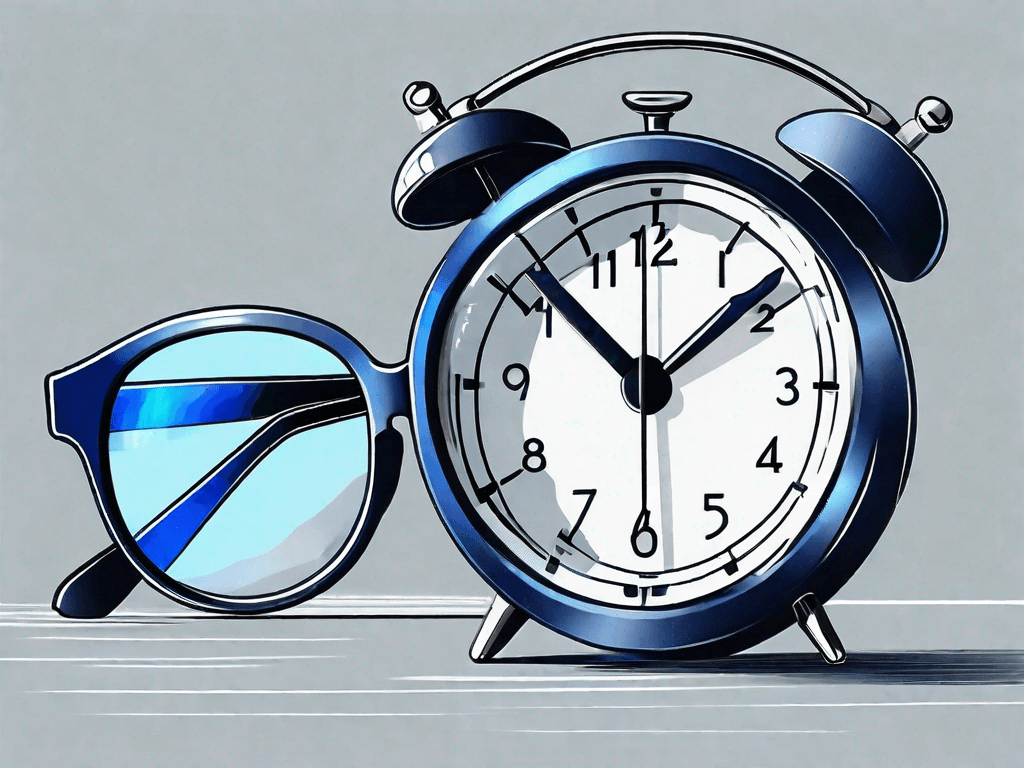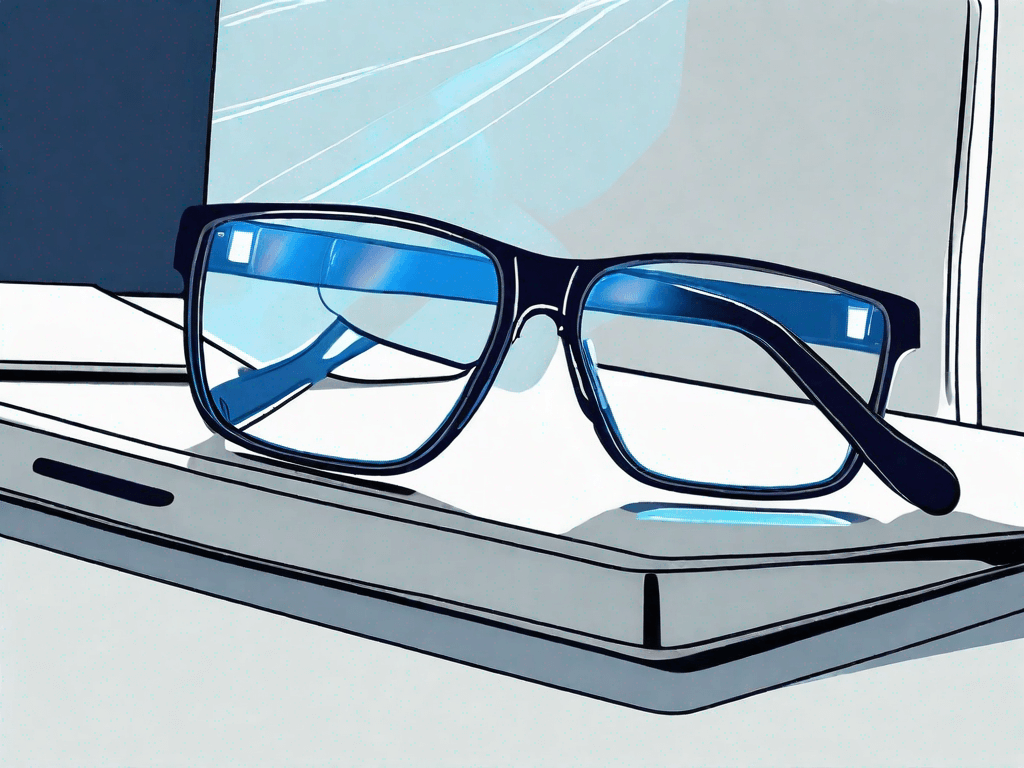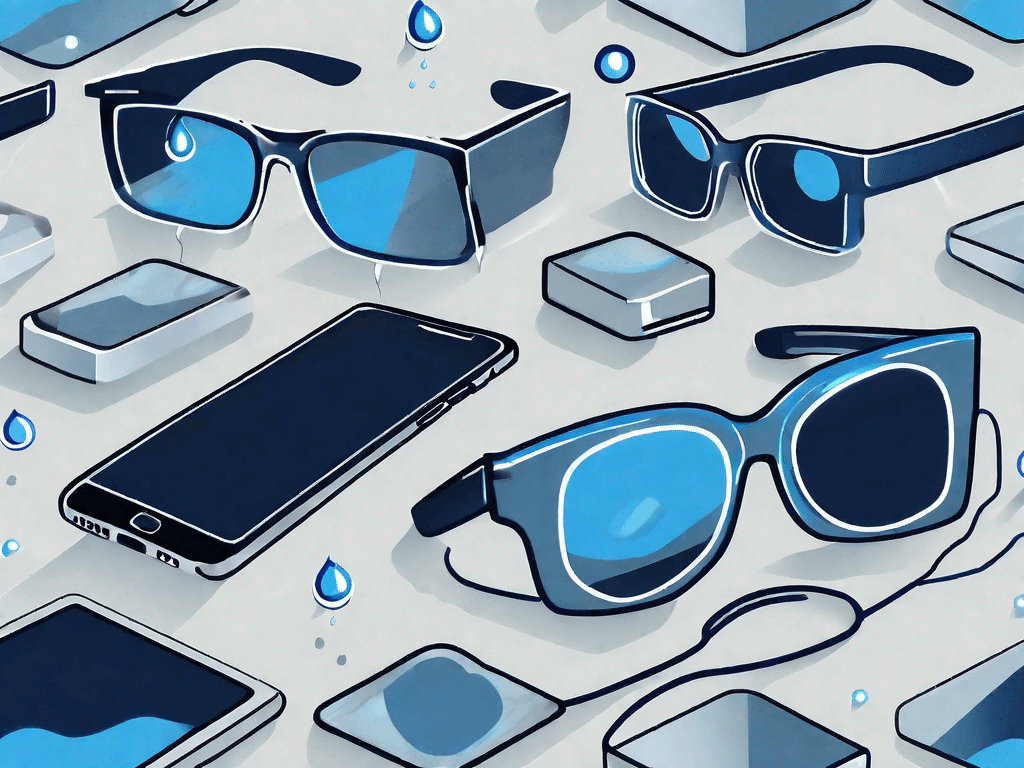When Is the Best Time to Wear Blue Light Glasses?
In today's digital age, our eyes are constantly exposed to blue light emitted by electronic devices such as smartphones, tablets, and computers. This prolonged exposure has been linked to various eye problems, including digital eye strain, dry eyes, and even sleep disorders. In this article we'll explore how blue light effects us and when is the best time to wear blue light glasses to protect their eyes and maintain optimal eye health.
Understanding Blue Light and Its Effects
Before delving into when it is best to wear blue light glasses, it is important to first understand what blue light is and how it affects our eyes.
Blue light, also known as high-energy visible light, is a type of light that is emitted by the sun as well as electronic devices such as smartphones, tablets, and computer screens. It falls within the visible light spectrum and has a shorter wavelength and higher energy compared to other colors in the spectrum.
When we are exposed to blue light, it can have various effects on our eyes. The short wavelength of blue light means that it scatters more easily than other colors, which can cause eye strain and fatigue. This is because our eyes have to work harder to focus on the scattered light, leading to discomfort and blurred vision.
In addition to eye strain, prolonged exposure to blue light can also lead to other eye problems. One common issue is dry eyes, which occurs when the eyes do not produce enough tears to keep them lubricated. This can cause a gritty or burning sensation, redness, and even temporary blurred vision.
Another potential effect of blue light is headaches. Some studies have suggested that exposure to blue light can trigger migraines or make existing headaches worse. This is thought to be due to the impact of blue light on the brain and its ability to disrupt certain chemical processes.
Furthermore, blue light can have a significant impact on our sleep patterns. The blue light emitted by electronic devices can suppress the production of melatonin, a hormone that regulates sleep. This can make it harder to fall asleep at night and can lead to insomnia or disrupted sleep patterns.
Perhaps the most concerning effect of blue light is its potential to cause damage to the retina. The retina is the light-sensitive tissue at the back of the eye that is responsible for transmitting visual information to the brain. Prolonged exposure to blue light can lead to the production of reactive oxygen species, which can cause oxidative stress and damage to the retinal cells. Over time, this damage can contribute to the development of age-related macular degeneration, a leading cause of vision loss in older adults.
Given the potential negative effects of blue light on our eyes, it is important to take steps to protect our eyes from excessive exposure. One effective way to do this is by wearing blue light glasses, which are specially designed to filter out or block blue light. By reducing the amount of blue light that reaches our eyes, these glasses can help alleviate eye strain, reduce the risk of dry eyes, and promote better sleep.
The Science Behind Blue Light Glasses
The rising popularity of blue light glasses lies in their ability to filter out or block a significant amount of blue light. But how exactly do these glasses work?
Blue light glasses are equipped with special lenses that contain a filter designed to block or absorb blue light. These lenses help to reduce the amount of blue light that enters our eyes, thus minimizing the potential harm caused by prolonged exposure.
But what is blue light, and why is it a concern? Blue light is a high-energy, short-wavelength light that is emitted by electronic devices such as smartphones, tablets, and computers. It is also present in natural sunlight. While blue light is essential for regulating our sleep-wake cycle and boosting our mood and alertness during the day, excessive exposure to blue light, especially at night, can have negative effects on our health.
When we are exposed to blue light for extended periods, it can lead to eye strain, eye fatigue, and dry eyes. This is because blue light scatters more easily than other colors, causing it to focus in front of the retina rather than on it. This constant refocusing strains the eye muscles, leading to discomfort and fatigue.
Furthermore, excessive blue light exposure at night can disrupt our sleep patterns. Blue light suppresses the production of melatonin, a hormone that regulates sleep. When our bodies are exposed to blue light in the evening, it tricks our brains into thinking it's still daytime, making it harder to fall asleep and potentially leading to sleep disturbances.
Health Benefits of Blue Light Glasses
Wearing blue light glasses can offer various health benefits. By reducing the amount of blue light that reaches our eyes, these glasses can alleviate eye strain, reduce the risk of eye fatigue, and improve visual comfort.
In addition to these immediate benefits, blue light glasses can also have long-term effects on our eye health. By minimizing our exposure to blue light, we can reduce the risk of developing age-related macular degeneration (AMD), a leading cause of vision loss in older adults. AMD occurs when the macula, the part of the retina responsible for central vision, deteriorates over time. Studies have shown that prolonged exposure to blue light can accelerate this degeneration process.
Furthermore, blue light glasses can help regulate our sleep patterns. By blocking or absorbing blue light, these glasses prevent the suppression of melatonin production, ensuring that our bodies can naturally wind down and prepare for sleep. This can be especially beneficial for individuals who frequently use electronic devices before bedtime or work night shifts.
It's important to note that while blue light glasses can provide significant benefits, they are not a cure-all solution. It's still crucial to practice good eye health habits, such as taking regular breaks from screens, maintaining proper lighting conditions, and ensuring proper distance and posture when using electronic devices.
In conclusion, blue light glasses work by filtering out or absorbing blue light, reducing the potential harm caused by prolonged exposure. They offer various health benefits, including alleviating eye strain, reducing the risk of eye fatigue, improving visual comfort, and regulating sleep patterns. By understanding the science behind blue light glasses, we can make informed decisions about protecting our eyes and overall well-being in the digital age.
Determining the Best Time to Wear Blue Light Glasses
While blue light glasses are effective in filtering blue light, it is crucial to understand when it is most important to wear them to maximize their benefits.
Blue light glasses have gained popularity in recent years due to the increasing use of digital devices in our daily lives. These glasses are designed to block or filter out the harmful blue light emitted by electronic screens, such as smartphones, tablets, and computers. By reducing our exposure to blue light, these glasses aim to alleviate eye strain, improve sleep quality, and protect our overall eye health.
Blue Light Exposure During the Day
During the day, exposure to natural blue light from the sun is essential for regulating our circadian rhythm and promoting wakefulness. However, excessive exposure to artificial blue light from digital devices can disrupt this balance. It is recommended to wear blue light glasses when using electronic devices for prolonged periods during the day to reduce eye strain and maintain visual comfort.
When we spend long hours in front of screens, our eyes can experience symptoms like dryness, redness, and fatigue. This is known as digital eye strain or computer vision syndrome. Blue light glasses can help alleviate these symptoms by reducing the amount of blue light that reaches our eyes. By wearing these glasses during the day, we can protect our eyes from the potential long-term effects of excessive blue light exposure.
Blue Light Exposure During the Night
Exposure to blue light at night can have a profound impact on our sleep patterns. The blue light emitted by electronic devices can suppress the production of melatonin, the hormone responsible for regulating sleep. It is especially important to wear blue light glasses in the evening, a few hours before bedtime, to mitigate the negative effects on sleep quality and ensure a restful night's sleep.
Our bodies naturally produce melatonin in response to darkness, signaling that it's time to sleep. However, the blue light emitted by screens can trick our brains into thinking it's still daytime, inhibiting the production of melatonin and making it harder to fall asleep. By wearing blue light glasses in the evening, we can block the harmful blue light and allow our bodies to naturally produce melatonin, promoting a more restful and rejuvenating sleep.
Furthermore, wearing blue light glasses in the evening can also help reduce the risk of developing sleep disorders, such as insomnia. By minimizing our exposure to blue light before bedtime, we can maintain a healthy sleep-wake cycle and improve our overall sleep quality.
In conclusion, the best time to wear blue light glasses is during the day when using electronic devices for extended periods and in the evening, a few hours before bedtime, to protect our eyes from digital eye strain and promote a restful night's sleep. By incorporating these glasses into our daily routine, we can prioritize our eye health and improve our overall well-being.
Factors to Consider When Wearing Blue Light Glasses
In addition to understanding the best times to wear blue light glasses, there are a few other factors to consider to optimize their effectiveness.
Blue light glasses have gained popularity in recent years due to the increasing use of digital screens in our daily lives. These glasses are designed to block or filter out the harmful blue light emitted by electronic devices such as smartphones, tablets, and computers. By reducing our exposure to blue light, these glasses aim to alleviate eye strain, improve sleep quality, and protect our long-term eye health.
Your Daily Screen Time
Assessing your daily screen time is essential in determining when it is most beneficial to wear blue light glasses. If you spend a significant portion of your day in front of digital screens, wearing blue light glasses throughout the day is recommended.
Many of us rely on technology for work, entertainment, and communication, leading to prolonged screen time. Whether you are a student who spends hours studying online, a professional who works on a computer all day, or someone who enjoys binge-watching their favorite shows, your eyes are constantly exposed to blue light. Wearing blue light glasses can help reduce eye strain, dryness, and fatigue caused by excessive screen time.
Moreover, blue light glasses can also be beneficial for individuals who engage in outdoor activities. Although natural sunlight is a primary source of blue light, electronic devices emit a higher intensity of blue light. Therefore, wearing blue light glasses while enjoying outdoor activities can provide an added layer of protection against harmful blue light.
Your Sleep Pattern
Understanding your sleep patterns can also aid in deciding when to wear blue light glasses. If you are prone to using electronic devices before bed or suffer from sleep disturbances, wearing blue light glasses in the evening can help protect your sleep quality.
Electronic devices emit blue light that can disrupt our natural sleep-wake cycle, also known as the circadian rhythm. Exposure to blue light in the evening can suppress the production of melatonin, a hormone that regulates sleep. This can lead to difficulty falling asleep and lower sleep quality.
By wearing blue light glasses in the evening, you can minimize the impact of blue light on your sleep. These glasses filter out the harmful blue light, allowing your body to naturally produce melatonin and promote a more restful sleep. Whether you are scrolling through social media, watching a movie, or working on your laptop before bed, wearing blue light glasses can help mitigate the negative effects of blue light on your sleep patterns.
In conclusion, when considering the use of blue light glasses, it is important to assess your daily screen time and understand your sleep patterns. By wearing blue light glasses throughout the day, especially if you spend a significant amount of time in front of digital screens, and in the evening, if you engage in electronic device usage before bed, you can optimize the effectiveness of these glasses in protecting your eyes and improving your sleep quality.
Tips for Maximizing the Benefits of Blue Light Glasses
To make the most of your blue light glasses, it is important to adopt proper usage techniques and incorporate them into your overall eye care routine.
Blue light glasses have gained popularity in recent years as a way to protect our eyes from the harmful effects of prolonged exposure to blue light emitted by digital screens. However, simply wearing these glasses is not enough. To truly maximize their benefits, it is crucial to understand how to use them effectively and pair them with other eye care practices.
Proper Usage of Blue Light Glasses
When it comes to using blue light glasses, consistency is key. It is important to wear them consistently whenever you are exposed to digital screens, whether it's during work hours or leisure time. By doing so, you can ensure that your eyes are protected from the potentially damaging effects of blue light.
When wearing blue light glasses, it is essential to position them correctly on your face. Place them on your nose bridge, making sure they sit comfortably and securely. This will not only enhance their effectiveness but also prevent any discomfort or distractions while you are working or enjoying your favorite digital activities.
In addition to wearing them properly, it is crucial to keep your blue light glasses clean. Regularly cleaning them will help maintain their clarity and efficiency. Use a soft, lint-free cloth and a gentle cleaning solution to remove any smudges or dirt that may accumulate on the lenses. By keeping your glasses clean, you can ensure that you are getting the full benefits of blue light protection.
Pairing Blue Light Glasses with Other Eye Care Practices
While blue light glasses can offer significant eye protection, it is essential to complement their use with other healthy eye care habits. These habits can further enhance your eye health and overall well-being.
One important practice to incorporate into your routine is taking regular breaks from screen time. Prolonged exposure to digital screens can strain your eyes and lead to discomfort or fatigue. By taking short breaks every hour or so, you give your eyes a chance to rest and recover. During these breaks, try to look at an object that is at least 20 feet away for 20 seconds. This is known as the 20-20-20 rule and can help alleviate eye strain caused by excessive screen time.
In addition to taking breaks, maintaining a balanced diet rich in eye-healthy nutrients is crucial for optimal eye health. Foods such as leafy greens, citrus fruits, and fish that are high in omega-3 fatty acids can provide essential vitamins and minerals that support eye health. By nourishing your eyes from within, you can further protect them from the potential damage caused by blue light exposure.
It is important to note that while blue light glasses can help reduce the potential negative effects of blue light, they are not a cure-all solution. It is still important to practice good overall eye care and maintain a healthy lifestyle to ensure optimal eye health.
In conclusion, wearing blue light glasses can help protect our eyes from the harmful effects of prolonged blue light exposure. By understanding the science behind blue light glasses and determining the best times to wear them, we can optimize their benefits and maintain optimal eye health. Incorporating these glasses into our daily routine, along with other eye care practices, can help us safeguard our vision in the digital era.





